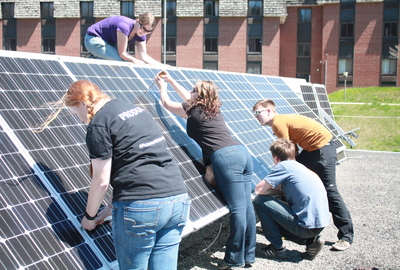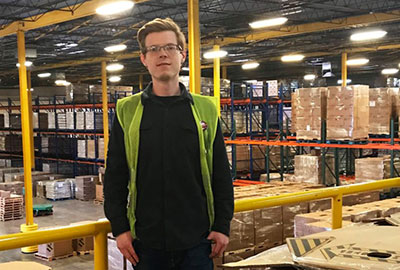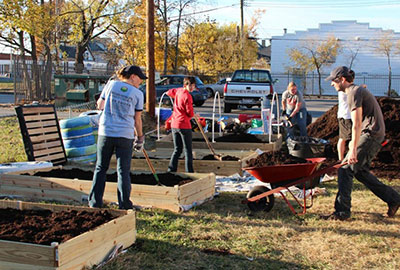Sustainability Studies
The sustainability studies major focuses on the relationship between human beings (both individually and collectively) and the natural world.
In keeping with the liberal arts mission of the College, the sustainability studies program is committed to both transdisciplinary and experiential explorations of sustainable development and sustainability—the challenge of meeting needs of the present (such as health, energy, food, shelter, and transportation) while ensuring a viable world for future generations.
The mission of the program is to prepare students for positions of leadership in sustainable development and studies, through an informed and dynamic leadership model in sustainability and environmental citizenship. Increasingly, the issues of most pressing national and global need are found within the areas of sustainable development and sustainability. Issues of sustainable economic development (e.g. ecotourism, energy independence), maintenance of healthy communities (e.g. water quality, green space design), and environmental conservation (e.g. habitat connectivity) loom large and increasingly offer employment and graduate program opportunities to students.
Careers
Recent graduates from the Sustainability Studies program are currently working with Trout Unlimited, Point Lookout Maryland State Park Service, Virginia Department of Conservation and Recreation, Community Food Bank of Southern Arizona, San Juan Watershed, and a variety of other non-profits, state and federal agencies. Graduates are also pursuing graduate degrees from Chatham University, Arizona State University, Wheeling University, and American Public University. Chatham University provides priority entrance to the Falk School of Sustainability and Environment masters programs in in Sustainability and Food Studies and scholarships to highly qualified students.
Internships
The professional climate surrounding Davis & Elkins College offers sustainability studies students a wide range of possible internships. Students intern at the West Virginia Department of Natural Resources, and the U.S. Forest Service, in the main offices in Elkins. Also, at nearby Monongahela National Forest, Fernow Experimental Forest, Canaan Valley National Wildlife Refuge, and Blackwater Falls State Park. For students wanting an internship at home during the summer, internships have been pursued at Maryland State Park Service, Virginia Division of Conservation and Recreation, Parks Canada, Trout Unlimited, National Park Service, and non-profits.
Leading the Way.
Facilities
The Biology and Environmental Science Department is housed in the modern Eshleman Science Center.
The Department has five teaching laboratories and a departmental computer laboratory The S. Benton Talbott Seminar Room located in the Science Center is a conference room where upper level classes are held, students share their research experiences with other students, and where invited speakers share their interests and expertise with students.
The Department has a variety of scientific instrumentation including microscopes, air pollution and water pollution monitoring equipment, laboratory instrumentation, and field sampling equipment. Recent additions to the cell and molecular biology lab include a programmable thermocycler for PCR analysis, UV/Vis spectrophotometer, microcentrifuges, and gel electrophoresis equipment. The Department also has an extensive collection of microscope slides and audiovisual media materials. Special facilities include a weather station, a controlled environment chamber and the spacious Tolstead Greenhouse. The Davis & Elkins College Herbarium contains over 3,000 specimens of vascular plants and is also the repository of the West Virginia State Fungi collection. The Department also has a computer lab equipped with GIS/Remote Sensing software and a large-scale plotter.
The Davis & Elkins College Biology and Environmental Science Department is also a partner in a cooperative Appalachian watershed study (CAWS) and maintains an experimental watershed, the Pigeon Creek Watershed. Davis & Elkins faculty and students are involved in a series of ongoing research projects within this area. Field studies and student research projects are also carried-out within the Robert E. Urban Nature Area located on the campus within a few minutes walk of the Eshleman Science Center.
The nearby Monongahela National Forest and other nearby natural areas constitute an immense and highly varied natural laboratory for biological and environmental investigations. The following areas are within an hour’s drive of the campus:
- Spruce Knob – the highest point in West Virginia at 4,862 feet
- Seneca Rocks
- Blackwater Canyon (under study as a new national park)
- Bear Heaven Natural Area
- Blister Swamp
- Big Run Bog natural area
- Dolly Sods Wilderness
- Otter Creek Wilderness
- Upper Laurel Fork Wilderness
- Lower Laurel Fork Wilderness
- Canaan Valley National Wildlife Refuge



Clubs
Interested in the sciences? GreenWorks! may be for you.
GreenWorks!
Put your beliefs about the importance of sustainability to work in the community.
GreenWorks! is the student sustainability organization of D&E’s Center for Sustainability Studies. From changing out light bulbs in Halliehurst to planting red spruce in Canaan Valley, student volunteers are making a difference campus-wide and in the surrounding community.
Among the many opportunities allowing students to become active in sustainability research and community projects, the group has completed three solar panel installations on campus. The most recent solar installation, the largest on a residential college/university in West Virginia, was initiated by students who were inspired to start the project after attending Mother Earth News conferences the past several years. Students installed the system under the guidance of Matt Sherald, owner of Power in My Backyard (PIMBY), located in Thomas, W.Va.
For more information about getting involved, contact Dr. Crystal Krause.
Division Directory
Lead the Way at D&E. Contact us today.













